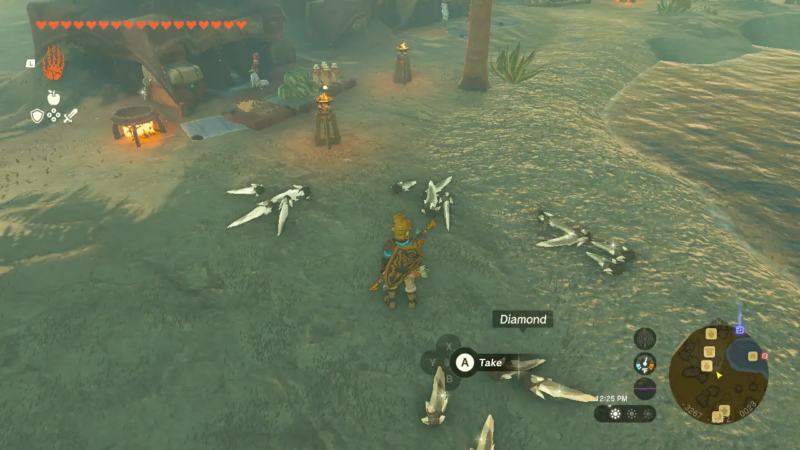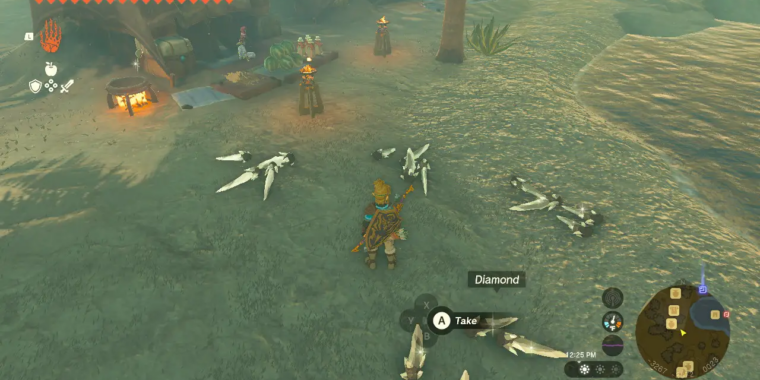
Nintendo
Well, it was fun while it lasted.
Since a couple of weeks, The Legend of Zelda: Tears of the Kingdom players have been able to use a surprising number of glitches to endlessly duplicate items, materials, weapons, and more to their heart’s content. But the endless item fest officially comes to an end today, with report data miners that the new ver. 1.1.2 game update fixes these unintended endless item glitches (you can still replenish your inventory before installing the update, by all accounts).
Though Nintendo lumps this fix under “various issues”. [that] have been addressed to improve the gameplay experience,” I’m reluctant to call this an improvement. On the contrary, I think Nintendo should embrace this “glitch” and create secret codes for infinite items (and money and health, etc.) an integral, intentional option for players who just want to tinker with the game’s awesome creation engine.
I just want to build
Tears of the Kingdom is essentially a game about building. The game’s Ultrahand and Fusion abilities are designed to unlock the player’s creativity and encourage a childlike sense of experimentation and wonder. There are tons of videos of players using Link’s new powers to build incredible machines, weapons, and wild tools in ways the developers probably never imagined.
However, when I watch videos like this, I can’t help but think of the unprecedented grind these creators had to go through in gathering the basic skills and materials often required for their elaborate construction projects.
Traveling on horseback in Tears of the Kingdom?
No fam, big wheel 🤝🛞 pic.twitter.com/2YILtgUs10
— liccnuke (@liccnuke) May 16, 2023
Don’t get me wrong, I understand that there are major game design reasons for players to scream and fight for limited resources in the game. The slow rollout of various skills, weapons, Zonai devices, and more helps players slowly get to know the game’s systems. Those carefully curated resources also create an incredibly satisfying gameplay loop, forcing players to overcome numerous mini-obstacles and making each new achievement in the game’s vast world feel “earned”.
But sometimes you don’t want to “earn” your pleasure. Sometimes you want to skip all that carefully designed gameplay grind and just play with the game like it’s a big box of Lego blocks. Sometimes you just want to fly around Hyrule in a jet-powered rocket plane without spending 15 minutes collecting rocket plane building materials. Sometimes you just want to use an overpowered weapon to rip through enemies like tissue paper just because you can.
Rent out Tears of the Kingdom players indulging in those desires when they want to would make it a better game and wouldn’t ruin the game as it currently exists in any way.
A sandbox history
Plenty of developers in gaming’s short history have understood and conceded the desire of players to skip the “intended” gameplay grind to just do some tinkering in a game’s sandbox. sim city 2000for example, lets players use codes to get functionally infinite funding for the construction of metropolises. Grand Theft Auto 3Thanks to the secret codes, players can get as many weapons, money and health as they want. DemiseThanks to the secret codes, players can cut through walls to their heart’s content in “god mode”. Debugging modes in games like Sonic the Hedgehog allows players to use level design tools intended for the developers.
The existence of these secret codes (which weren’t so “secret” after they routinely filled entire sections of 90s video game magazines) didn’t ruin the “intended” design of these games; players who wanted the “real” gaming experience could easily ignore them. Nor did the use of these codes mislead anyone using them into thinking they had “beat the game” in the real sense of the word; players who use cheats know that they are just indulging in some crazy fun in the game’s world.

